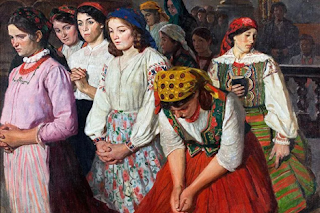Homily for the
27th Sunday of Ordinary
Time
Oct. 2, 2022
Hab 1: 2-3; 2: 2-4
St. Francis Xavier,
Bronx
“How long, O Lord? I cry for help, but you do not listen!” (Hab
1: 2).
Habakkuk
prophesied briefly at the beginning of the 6th century B.C., a very difficult
time for Israel. Within the kingdom of
Judea, idolatry and political corruption were rife. Externally, the Babylonian Empire threatened
to conquer the kingdom. The prophet
questions God: “Why do you let me see
ruin? Destruction and ruin are before me”
(1:3).
Those
are the cries of desperate people. They
sound like some of our contemporary experience as we observe and lament the war
in Ukraine. That’s only one of about 2
dozen wars and other conflicts going on around the world, in which tens of
thousands of people, both combatants and civilians, are killed each year.
We’re aware of the violence in our own society: mass shootings, crime on the streets and in the subways, domestic violence, child abuse, and abortion.
If
that’s not enuf suffering, nature wreaks violence upon us. We’ve just witnessed Hurricane Ian tearing
Florida apart, right after Fiona crushed Puerto Rico and the Dominican
Republic. Similar
storms—typhoons—frequently occur in the Far East and do similar damage but get
less of our attention. Every year
thousands of people are displaced by floods like those that devastated Pakistan
this summer. Wildfires destroy hundreds
of square miles of forest and hundreds of homes. Famine causes mass starvation in the Horn of
Africa and other parts of the world.
Besides
all that, all of us suffer personal disruptions, difficulties, and
challenges: personal or family illness;
family tensions; maybe a feud with relatives; worry about children’s schooling
or distance or behavior; employment issues; financial stress. These sorts of things hit us closer to home
than anything in Florida or California or Ukraine.
Violence
and ruin and worry are all around. We
ask God, like Habakkuk, “Why must I look at misery?” (1:3).
The
Lord answered the prophet with a challenge to him to have faith. Deliverance “will surely come” (2:3). The just person—that is, one who is faithful
to God—“shall live because of his faith” (2:4).
What
does faith mean amid the natural and man-made violence and ruin and personal
problems that we experience? It means,
1st, trying to live by God’s designs. If
there’s violence from war and crime, from indiscriminate bombing, shootings in
our schools and shopping malls, and the destruction of unborn people, those are
human choices that pay no heed to God or to the image of God in every
person. If we live by faith, we do our
best to respect everyone in our own lives, including family (first),
co-workers, neighbors, people who provide services to us. We try to foster conditions that enable other
people to live better, e.g., thru food policy, housing policy, and immigration
policy.
2d, faith means turning to God in prayer—even prayers of anguish like Habakkuk’s. We pray for safety in storms, for relief from droughts, for the preservation of peace where it’s threatened and its restoration where it’s longed for, as in Ukraine, Yemen, Congo, West Africa, places overrun by drug cartels. We can’t control the weather, and we can’t control human hearts. God can convert war-like and violent hearts. It seems that hearts also need to be converted if our climate is to be salvaged from rising seas, rising temperatures, deforestation, and polluted air.
3d,
faith means having confidence in God’s power to make things right. That may be a long-term prospect. “The vision still has its time, presses on to
fulfillment, and will not disappoint; if it delays, wait for it” (2:3). Act as regards your own power and ability,
pray for God’s kingdom to come more evidently in human society, and wait
patiently for God, who made things right for Jesus of Nazareth by raising him
after his passion and will see us thru even a violent age and our own
suffering; who forgives our personal sins, empowers us to act like Jesus toward
our neighbors, and leads us toward eternal life—“if [we] have faith the size of
a mustard seed” (Luke 17:6).
Commentators
at America
magazine offered some similar reflections today:
and


No comments:
Post a Comment